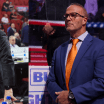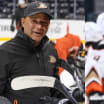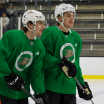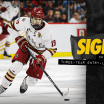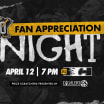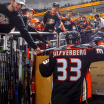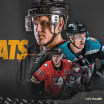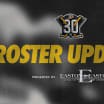Fans of the original Mighty Ducks know the name Bobby Dollas. The rugged defenseman played a prominent role on the Mighty Ducks blueline for five seasons, including the team's inaugural season, and helped Anaheim to its first playoff appearance in 1996-97.
Toyo Tires Ducks Alumni Spotlight: Bobby Dollas
The likeable defenseman was a member of the inaugural Mighty Ducks team after getting selected in the 1993 NHL Expansion Draft
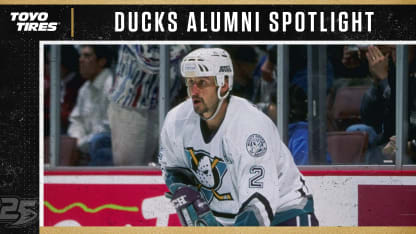
He was one of the first Mighty Ducks - taken 14th overall in the 1993 NHL Expansion Draft that included the Florida Panthers. Some of the players Anaheim chose before Dollas included Guy Hebert (second overall), Ron Tugnutt (sixth overall), Alexei Kasatonov (eighth overall) and Sean Hill (ninth overall). Dollas was a part of something new and exciting in Southern California, and it wasn't long before the landscape won him over.
More than two decades later, Dollas found himself in Orange County again, inside the same arena that resurrected his NHL career. He was here for the Rangers-Ducks game on November 1 to celebrate the Wild Wing 'Breakout' Jersey he and his teammates wore during the 1995-96 season. It was part of the Ducks 25th Anniversary Jersey Tribute Night series to celebrate each of the jerseys worn by the franchise since its inception.
How he eventually became a Mighty Duck was the result of various factors. After spending most of the 1992-93 season with the American Hockey League's Adirondack Red Wings, Dollas was in search of a new opportunity. He was already a veteran of the National Hockey League, but a numbers game with the Detroit Red Wings had the 28-year-old Montreal, Quebec native on the outside looking in.
Selected by the Winnipeg Jets with the 14th overall pick in the 1983 NHL Draft, Dollas spent nearly 10 years with the Jets, Quebec Nordiques and Red Wings before his assignment to Adirondack. After being named the AHL Defenseman of the Year for his 43-point campaign in 1992-93, the Red Wings made him available in the 1993 NHL Expansion Draft featuring two teams from the Sun Belt. As a guy who spent all of his hockey career in cold-weather climates, Dollas was ready for something new.
"I knew I had a good chance of getting picked up in the expansion," he said. "I just had a hard time finding a Steady Eddie job. Being on the East Coast, at the time I was sort of hoping for Florida because it was closer to home. When I got picked up by the Ducks, I remember flying down here and thinking, Wow, what a place. You see the arena, there weren't any arenas like this place at the time. A lot of wood, brass, marble. I never saw that in arenas before."
Like the rest of his Mighty Ducks teammates, Dollas was a transplant. And like many of them, he was eager to start anew.
"It was a bit of a culture shock with a lot of us," he said. "When we came in here, [original head coach] Ron Wilson said, "Okay guys, you want a job? A career? Here's your chance. You have a chance to establish a career here."
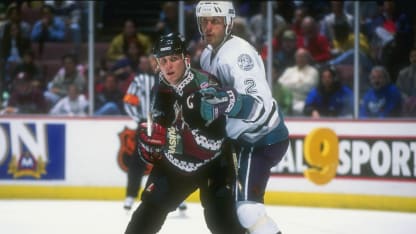
With a workmanlike attitude, Dollas took those words to heart. "I was always in a tough spot wherever I was playing," he said. "They either had some good veteran guys or some good youth at the same time. I was always fighting for a spot with players. [In Detroit] Nick Lidstrom was there, Vladimir Konstantinov was there. Steve Chiasson, Brad McCrimmon. They already had established guys. I went in as a free agent. I did well, but it was a numbers game. I went to the American Hockey League and told myself I'm not going to let it get me down. I had a career year and won the American Hockey League Defenseman of the Year with the Adirondack Red Wings. I really wanted to make a career."
Dollas recalls a story about Jack Ferreira, the franchise's first general manager. "From what I hear, Jack went to see a game, but he was there to see someone else," Dollas said, with a laugh. "But he saw me play. So he said something like, 'Nevermind that [other] guy. How about that guy Dollas? Is he available?' The rest is history because he picked me up in expansion."
Back then, the Mighty Ducks were as tough as they came. They had guys who kept the opposition honest. Maybe part of it was out of necessity to overcome the stigma associated with the cartoonish Mighty Ducks crest on their original home and road jerseys.
"Maybe at the time that was the mentality around the league," Dollas said. "We were a really tough team. Every fourth line in the league was pretty tough. We had Stu Grimson, Todd Ewen, Kenny Baumgartner and Warren Rychel. We had a bunch of guys who could drop the gloves."
When asked what he thought about the Wild Wing jersey, Dollas didn't flinch. "It's one of my favorite jerseys," he said. "A lot of times, a hockey player looks at it and thinks it's a little bit soft or gimmicky. I loved the color. I thought it really stood out. With the Wild Wing standing on the chest, I thought it was pretty cool. A lot of guys at that time were traditionalists, and thought it was too retro or funky."
As one of the older players at that time, Dollas served as a role model for some of the younger Mighty Ducks, which included two prominent blueliners. "I helped out Ruslan Salei," Dollas said. "He came in and had a hard time cracking the lineup. I talked to him about what he needed to do to take it to the next level.
"At the time, I had a 25-pound weight vest I used to train with on the ice in the summers. I used to do drills with it. He started using the vest. I used it because I wanted to be faster. I helped Oleg Tverdovsky a lot. He was a very good defenseman. Very gifted. He might've been a little bit ahead of his time because it was a dump-and-chase, grinding, hard-nosed game at the time. He wasn't a guy who liked to go in the corner and bang. He wanted to skate with it. In today's game, I bet he'd be a phenomenal player because he was that fast."
As Dollas was speaking about his early days in the NHL, Ducks coach Randy Carlyle walked by. He and Dollas exchanged greetings and laughs, and took a few minutes to catch up. Carlyle, of course, was one of the premier defensemen of his time, winning the Norris Trophy in 1981 with Pittsburgh and serving as team captain of both the Penguins and Jets.
"You know he was my first d-partner in Winnipeg?" Dollas said, with a smile. "Randy took me under his wing when I was in Winnipeg. He was a good teammate. If he likes you, he'll go through the wall for you. I liked that. I learned from a guy like that."
It's evident why Dollas was such a well-liked guy in the locker room. A few minutes spent with him makes it feel like you've been friends for years. The bond he forged with his teammates from the inaugural '93-94 season will never be broken. Dollas says he still keeps in touch with guys like Garry Valk and Terry Yake. Last summer he golfed with Hebert here in Southern California.
"We had the 20th anniversary a couple years ago, and a bunch of us showed up," he recalled. "It was like we never left. We all got a little older, a little greyer and a little heavier. When we saw each other, what a great feeling it was to see all the guys again. I'm sure a lot of the other guys who had an opportunity to play here are still saying this was the best place to play. If there were opportunities after hockey, I would've stayed here. I loved it that much here. Seeing some of those guys you haven't seen in such a long time, I bump into guys once in a while. But a lot of the guys from the original team, we were from everywhere. When we saw each other again, it was like old times."
These days, Dollas is still involved in hockey. He runs his own hockey schools and clinics in Montreal for people of all ages, but loves working with kids. "I discovered soon after retirement I'm good with kids," he said. "I'm passionate about it. I'm also coaching a U18 program in Montreal. I have an opportunity when I get back home to possibly go to China to help develop hockey over there. There are opportunities to be done, and they need good, serious people who are good with kids."
Dollas says the success the Ducks have had over the years, peaking with a Stanley Cup championship in 2007, has gone a long way in the development of the game here at a grassroots level. These days, there are countless clinics and leagues for all ages - a stark contrast to the early days.
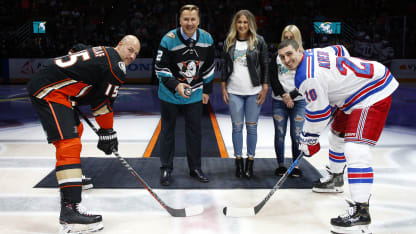
"When I first came here, there wasn't much," he said. "Things started to develop here slowly but surely. I'm sure losing in the Stanley Cup Final [in 2003] and winning in the Final [in 2007], bringing in star power like Paul Kariya and Teemu Selanne, there are quite a few good hockey players coming out now because of the Ducks and Kings. I have people following me on Facebook that are 35 or 40 years old talking about how they remember coming to games back then and how I was one of their favorite players."
Dollas relished his time here and loved the friendships he developed within the community. Those were new and exciting times, moments Dollas says he'll never forget.
"We were a bunch of guys who were so happy to be here," he said. "We wanted to connect with the public. We were always shaking hands. It was that personable at that time because a lot of people didn't know about hockey. They just didn't. Unless they were transported from somewhere else. I thought we built up a good relationship as people loving the players. That's important.
"I can't compare it to other sports, but hockey players are pretty good guys when you get to know them one on one. Once you befriend a hockey player, you have a friend for a long time. That's what it's all about."


